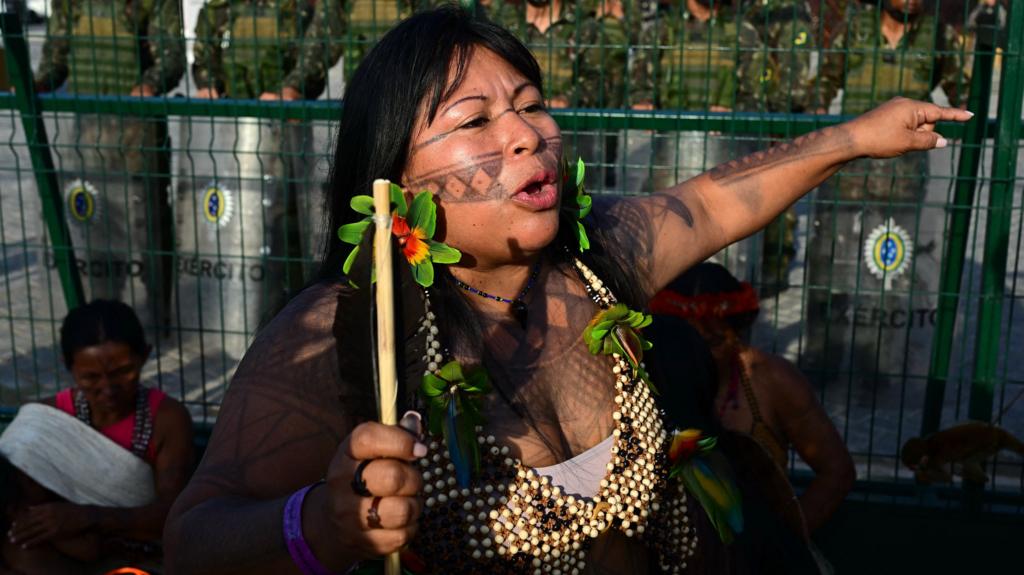“`html
Tensions have escalated at the COP30 UN climate talks in Belém, Brazil, as the summit nears its conclusion, with a contentious debate erupting over fossil fuels.
The core of the disagreement lies in the varying opinions on the stringency of an agreement aimed at reducing global reliance on fossil fuels, which are widely recognized as the primary drivers of climate change.
This dispute has created divisions among different blocs of countries, requiring consensus from all 194 parties to finalize a deal during the two-week summit.
Sources within the tightly guarded negotiating rooms indicate that discussions have become increasingly challenging.
“There is a lot of fighting,” one negotiator inside the room told the BBC, highlighting the intensity of the debate.
Brazilian President Luiz Inácio Lula da Silva, along with nations like the UK, is advocating for a stronger, more accelerated commitment from countries to curb their fossil fuel consumption.
This push aims to build upon the agreement reached at COP28 in Dubai two years prior, which committed signatories to “transition away from fossil fuels.”
While an initial draft agreement in Brazil presented three options, including timelines, the latest version omits any specific mention of fossil fuels.
French Environment Minister Monique Barbut asserted that “oil-producing countries – Russia, India, Saudi Arabia, but joined by many emerging countries” were blocking the deal, adding that “As it stands now, we have nothing left.”
The BBC has reached out to Saudi Arabia for comment.
Speaking to reporters outside the negotiation room, Secretary of State for Energy Security and Net Zero Ed Miliband stated the UK’s determination to keep “alive” a plan for further action on fossil fuels at the talks.
“It’s hard, it’s sweaty, it’s frustrating. There’s a big divergence of views,” he acknowledged.
“We are determined that one way or another, this innovative idea, with the support of more than 80 countries to have a roadmap to transition away from fossil fuels, is kept alive at this COP,” he said.
Mr. Miliband further commented, “I think that in 10-20 years time people will say, ‘You were the generation that saw the climate crisis around you. Did you take action? Did you rise to the challenge?’ It’s that sense of what will people think of us in the future that keeps me going.”
Certain developing nations have withheld support for the fossil fuel deal, citing the need for wealthier countries to first fulfill their pledges of providing climate finance to assist in adapting to the impacts of climate change.
“We need adaptation financing because we are already doing a lot to reduce emissions,” Aisha Moriana, head of Pakistan’s delegation, told BBC News.
“Who will pay the cheque? We are looking forward to receiving that money,” she stated.
When asked if Pakistan would support the fossil fuel deal upon receiving new financial assurances, Ms. Moriana responded, “That is something which cannot happen in a few hours, and it requires a lot of financing.”
In the hallways, activist groups have been chanting “fossil fuels out” and displaying banners with messages such as “Stop Amazon oil” and “1.5C under threat: time to act.”
“A good outcome could mean giving us a future and a present that it is worth fighting for,” International Youth Climate Movement campaigner Shurabe Mercado, from Mexico told BBC News.
“Our generation is most at risk and we are most at stake.”
The meeting exemplifies a fraught and delicate diplomatic process, as nations navigate their national interests while attempting to address the global challenge of climate change.
Some observers question the efficacy of these intricate, legalistic discussions, which often exceed their allotted time.
However, others highlight the significant strides made in recent years in tackling climate change, including advancements in renewable energy, electric vehicles, and nature conservation, all linked to COP agreements.
Other issues under discussion at COP include the discrepancy in climate finance promised by wealthier nations to developing countries disproportionately impacted by climate change.
The latest draft deal advocates for global efforts to triple financing available to countries by 2030.
However, it remains unclear whether this funding should originate from richer nations or alternative sources, such as the private sector.
This ambiguity could provoke discontent among less affluent countries, who seek greater support from wealthier nations and heavily criticized a deal at last year’s COP29 in Baku, Azerbaijan, deeming it insufficient.
Deforestation, particularly prevalent on the periphery of the Brazilian Amazon, has also been a contentious issue.
The new draft agreement weakens earlier wording regarding addressing deforestation.
“The wildlife and indigenous people who call the forest their home deserve better than this,” said Kelly Dent, Director of External Engagement for World Animal Protection.
The two-week meeting has been interrupted by two evacuations.
Last week a group of protesters broke into the COP venue in Belém carrying signs reading “Our forests are not for sale”.
On Thursday a fire broke out, burning a hole through the sheeting covering the venue and causing 13 smoke inhalation injuries. The summit was evacuated and closed for at least six hours.
The summit has garnered praise for including the largest contingent of delegates from indigenous groups to date.
Sign up for our Future Earth newsletter to get exclusive insight on the latest climate and environment news from the BBC’s Climate Editor Justin Rowlatt, delivered to your inbox every week. Outside the UK? Sign up to our international newsletter here.
Students played the roles of different countries, made speeches, and “negotiated” to strike deals.
India says it has met a key target of its previous climate action plan, but many say it needs to do more.
Climate Editor Justin Rowlatt was at the UN climate talks in Brazil when a fire broke out.
Australia will now support the Turkish bid to host the climate talks in return for their minister chairing them.
President Lula’s government recognises 10 new Indigenous lands in an effort to protect their culture and environment.
“`

